"We have to fight": Nikita Milivojević, Bitef and artistic freedom in Serbia
On the latest protests in Serbia and the decision not to extend the mandate of the artistic director of Bitef.
I’m still in Belgrade, where this week Serbia experienced the biggest protest in the country’s history. It was an incredible thing to witness. From morning until night the city pulsed with people If you want to understand why people in Serbia have been taking to the streets in such large numbers, I suggest reading my interview with Serbian director Nikita Milivojević about the recent decision not to extend his mandate at the Belgrade International Theatre Festival (Bitef). A short version appears on the Wiener Festwochen website, as part of its Resistance Now campaign, but there’s a longer version of this interview below, exploring what this says about artistic freedom in Serbia and what it means for the future of the festival.
If you want to support my writing while keeping this site largely paywall-free (though there will be occasional paid subscriber bonus posts, like this one on Robert Lepage’s Faith, Money, War and Love), for this week you can do so for just £4 a month or £40 a year. Or just share this newsletter with someone you think might find it interesting. That helps too.
The biggest protest in Serbia’s history took place on Saturday. People converged on Belgrade from all over the country. An independent monitoring group estimated the crowd at 325,000, but it seems likely the numbers were far larger given the way the protest percolated through the city. Every corner you turned, every side street you went down, there were protestors. Those who weren’t on the streets waved from windows and balconies. There were so many people that it took some hours to cross the bridge from New Belgrade on the other side of the Sava River. Even though the government had shut down all public transport and the day before the protests all trains into the city had been cancelled by a ‘security alert’ that conveniently lasted until Sunday, people still found their way to the city.
Things started the night before as wave after wave of students arrived in Belgrade. Many had been walking for days to get there. Some were limping, some were holding each other up, others were hobbling in their socks, their faces a mix of exhaustion and elation. They were met with hugs and cheers, a red carpet, medals, fireworks. Bikers roared around the streets, having pledged to protect the students. Emotions were high.
From early Saturday morning, the air began to fill with the sound of whistles, drums and vuvuzelas as well as shouts of “pumpaj” (“pump it up”, which has become the chant of the protests). Despite an intermittent drizzle, the mood was almost carnival-like, though there was a deeper purpose, the protest the latest, albeit biggest, in a series of anti-corruption actions which have swept the country since the collapse of the concrete canopy at Novi Sad railway station in November which killed 15 people and a sparked a country-wide fight for justice, transparency and accountability initiated by and driven by the country’s students. (Here’s a decent explainer by Una Hajdari for Politico on everything that’s taken place to date).
In a situation like this one might expect the authorities to try and do all they can to maintain order, but instead it felt like efforts were being taken to stoke tensions. President Aleksandar Vučić started talking in ominous tones about a would-be coup, (having already dubbed the protests a “colour revolution” which he blames on foreign interference). During the week leading up to the protests, a camp of pro-government students, who called themselves “the students who want to learn,” appeared in the park opposite the parliament building. Rows of decidedly new-looking tents quickly filled the green space. It’s alleged, however, that many of these people were not students at all (they certainly don’t like being asked what and where they’re studying), rather people who were paid or pressurised to be there. Two days before the protest a ring of tractors (tractors have played a very big part in these protests) appeared around the park, with the aim of ‘protecting’ these people from the protestors.
Their presence of this camp directly opposite the building which was supposed to be the focal point of the protest (and from where Milošević was ousted in 2000) was obviously a potential flashpoint, which was clearly the intention. However, on the day, the students reacted quickly in order to avoid escalation, relocating the protest from in front of Parliament to an adjacent neighbourhood. They made it clear that they wanted no part in any violence and were willing to wind things down early to maintain safety. While there were some incidents, the fact that the protest was mostly peaceful was largely down to their level-headedness.
It is, however, looking increasingly likely that some form of sonic weapon was used against protestors who were observing fifteen minutes of silence. At the time of writing it was still unclear exactly what happened here, but something clearly did, as you can see from this video footage from the night.
As concerning as this is, it would be a shame to let that overshadow what was achieved. Vast numbers of people – more than in any prior protest in the country - converged on the capital to make it plain they are tired with the current self-serving and nepotistic regime. As ever the students cleaned up scrupulously after the protests (while the park in which the pro-government ‘students’ had been camped out was left looking like a tornado had blown through it). The students are adamant that this isn’t over. They are not giving up. Their new slogan makes this plain: “Kraj je kad mi kažemo” (“This ends when we say.”)
“They need institutions they can control”
The protests somewhat eclipsed the fact that last week it was discovered that Nikita Milivojević’s mandate as artistic director of the Belgrade International Theatre Festival (Bitef) would not be extended. Milivojević had only been in the role since 2023. As of yet no-one has been appointed artistic director in his place and there’s a possibility no-one will be.
Bitef is one of the most prominent festivals in the region. Founded in 1967, by Mira Trailović and Jovan Ćirilov, Bitef established itself as a space for exploring new trends in theatrical production. It was a hotbed of the avant-garde. Over the years it presented work by some of the most significant artists working in both the West and the East: Peter Brook, Robert Wilson, Lev Dodin, Complicite, London’s Royal Court Theatre, New York’s LaMaMa Theatre, Merce Cunningham, Pina Bausch, and a multitude of others.
In 2006, the theatre director Anja Suša joined Ćirilov as curator, though he remained artistic director, and, following Ćirilov’s death, the theatre critic and scholar Ivan Medenica was appointed artistic director in 2015. He held the role until 2023, when he was essentially put in a position where he had to withdraw (as he discusses in this interview with Serbian newspaper Danas). This happened in February of that year, midway through the selection process for the festival which takes place annually in September, putting Milivojević in the difficult position of having to prepare the festival in an almost impossibly short amount of time.
Working together with his co-selectors, executive director Ksenija Đurović, and playwright and dramaturg Tijana Grumić, he pulled it off, but arguably last year was the first edition of Bitef that really featured the stamp of the new curatorial team, with a formally varied programme featuring Milo Rau’s Antigone in the Amazon and Carolina Bianchi’s Cadela Força Trilogy - Chapter I: The Bride and the Goodnight Cinderella as well as work by rising stars of the regional scene including Tjaša Črnigoj and Žiga Divjak. The festival was widely regarded as a success with the Mira Trailović Grand Prix going to the Croatian dramaturg Jasna Žmak, for her frank, funny solo performance this is my truth, tell me yours.
The festival opened with an address by Rau, a speech entitled Beauty Will Save the World (you can read the whole speech here), which was sharply critical of Rio Tinto and its proposed lithium mining project in the Jadar Valley, a project which the Serbian government supports, as does the EU – Olaf Scholz had recently been in town to secure supplies of lithium – despite widespread public opposition against the project. Rau’s speech resonated in the room, but to say it did not go down well with the authorities would be an understatement. I was a member of the festival’s international jury at last year’s festival, so saw first-hand how they were dealing with the fallout throughout the festival.
They weathered the storm at the time, but as Milivojević says, “we were sure that the consequences were coming. We were even making jokes about it.” More recently Milivojević has been vocal in his support of the students – he is a professor at the University of Arts in Novi Sad. “My students have my full support. I think what they are doing is something that must finally happen in our country,” he said. So, he was not surprised that this decision was taken, but he is concerned about its implications for the future of the festival.
Bitef, along with other key cultural events, including Fest, one of the region’s biggest international film festivals (which has controversially been postponed until September when it is likely to clash with Bitef), is overseen by the City Assembly of Belgrade, who appoint the artistic director and the board of the festival. As Đurović explains it, the Secretary for Culture is going to change the rule book so that instead of the City Assembly appointing artistic directors, it will be left to the board to decide whether they need an artistic director or not.
They only found out that Milivojević's mandate had not been extended when the new Board was appointed during a City Parliamentary session. “The session was disrupted by the opposition singing the national anthem throughout the session, so we needed to watch the YouTube stream in order to find out what happened," says Đurović.
It's important to understand what the role of an artistic director is in a festival of this nature, says Đurović. “They are the face of the event. This is very important for the festival, for its recognition and for its stability.” If you don't have an artistic director, someone to oversee all artistic decisions then, she says, everything will just be “flowing in the wind.” While an artistic director always works with a wider team, a festival without an artistic director will be “a very destabilized institution,” she says.
Both Milivojević and Đurović agree that the fact that the mandates for both the board and the artistic director lasted for only two years is about exerting control. “This means that if they are not satisfied with you, they're going to say: bye, bye,” says Milivojević. “This limited our artistic freedom.” Whether or not the festival is a success on an artistic level is irrelevant to them. “The most important thing to them is: are you with us or you are against us?” he says. “This is crazy. You can’t create a good festival in this way.”
Of course, as Đurović adds, there’s a solid argument to be made for limiting the length of time people can hold these roles, but this is not the reason this decision was taken. The timing of the decision also creates issues for the viability of this year’s festival. The planning of a festival of this size obviously takes considerable time. They’ve been preparing the next edition of the festival since July last year. Now they’re without an artistic director so that process can’t move forward, jeopardising a lot of their work. They’ve already had to cancel some of the planned productions. Whatever happens next, they’re unlikely to be able to restart work until the beginning of April. “You cannot produce an international festival in this time,” she says.
Since the festival was founded, Bitef has never missed an edition. Even during the fragmentation of Yugoslavia and the wars of 1990s, when Serbia faced international economic sanctions, Bitef was able to continue, albeit in a reduced format. In 2020, during Covid, a micro-outdoor festival took place. It now faces an uncertain future and damage to its reputation on the international scene. “It takes a lot of time to build a reputation, and it takes only two moves to break it,” Đurović says. “This is what happens when you have cultural policy where there isn’t a strategy and where their only concern is putting out fires.” It’s also very indicative that the Minister of Culture, when he does attend events, usually goes to things connected to national identity and cultural heritage. “I think it’s fairly clear in which direction our national cultural policy is going.” The onus on creating next year’s festival has been shifted to the board, but Đurović is not reassured by this. “I’m not sure if they understand that they're supposed to make the next festival.”
Given what’s happening to a high-profile event like Bitef, “you can only imagine what's going to happen with the smaller festivals and the more radical, progressive initiatives,” she adds. Culture in the country is already in a parlous state. Some major theatres may have only one or two premieres this year. The cultural budget has been reduced to 0.65%. “And instead of helping out, what you're doing is destabilizing things further,” says Đurović.
Where Đurović takes hope is from the students. “They instigate this kind of empathy in me, and I honestly didn't think I had this kind of empathy anymore. It's a bad time, but it's also the best time.”
Rau and the Vienna Festival, of which he is artistic director, have already put out a statement in solidarity with Milivojević and Rau also gave an interview with the Serbian newspaper Danas reiterating his support. This kind of international support matters because, as Milivojević makes plain, this decision not to extend his mandate was politically motivated. “This is a kind of censorship; actually, it’s the most dangerous kind. You're not free to talk. You're not free to think. It’s not a democratic country.”
“They don't want creative, free institutions,” he says. “They need institutions they can control. This is nothing that surprises us. We know these things, and we have to fight against them.”
This attempt to exert control over the cultural scene is, unfortunately, far from unique to Serbia and it’s on the increase. “Being an artist means, above all, being free,” he says. “We must constantly fight for complete artistic freedom because it’s constantly under threat, and not only in Serbia. It is a process that never ends!”
This week in European theatre
A round-up of festivals, premieres and other upcoming events over the next seven days.
Everything is Illuminated - Mina Salehpour directs an adaptation of Jonathan Safran Foer’s novel which focuses on the character of the Ukrainian interpreter and tour guide Alexander. It has its Austrian premiere at the Burgtheater in Vienna on 20th March.
Go With Your Heart - Forced Entertainment’s Tim Etchells and artist Vlatka Horvat collaborate on a new piece - their first choreographic collaboration - for Ballett Basel, about the ways in which events are processed by the body. It has its world premiere on the 21st March.
Frankenstein – Postponed from last year, Oliver Frljić’s latest production for the Maxim Gorki Theatre draws on Mary Shelley’s novel for a piece that explores the relationship between creator and creation. It has its world premiere in Berlin on 22nd March.

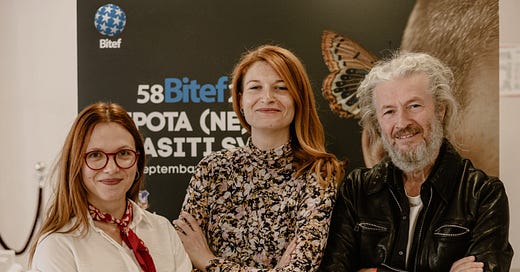



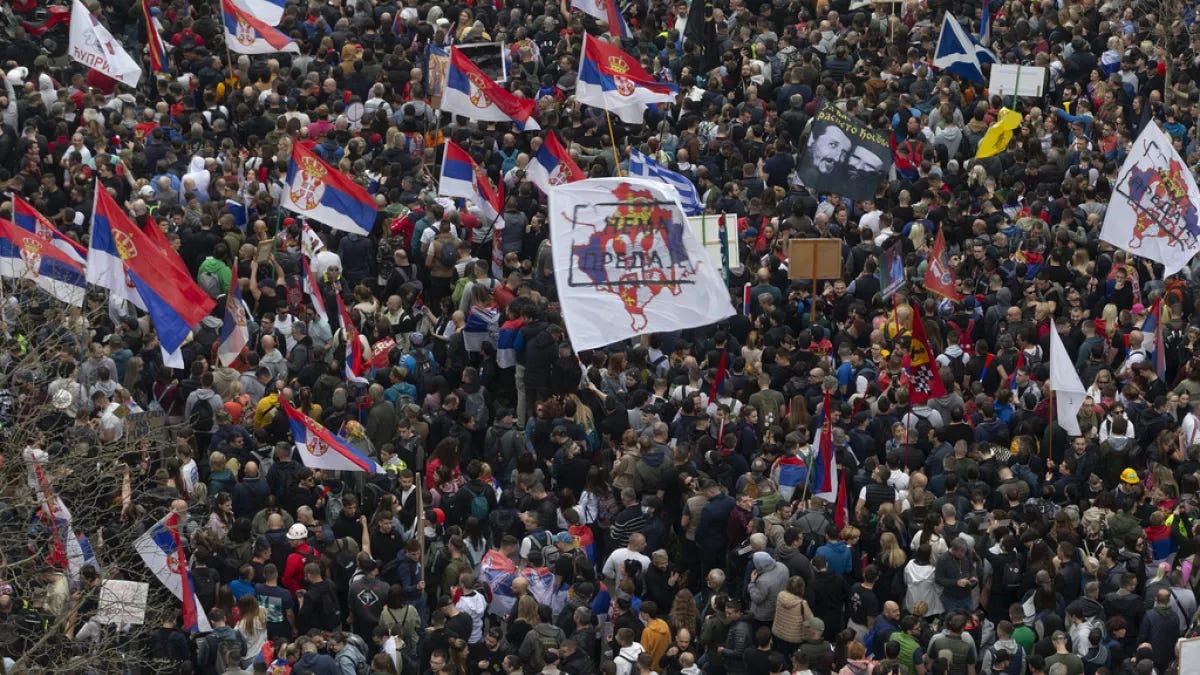
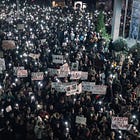
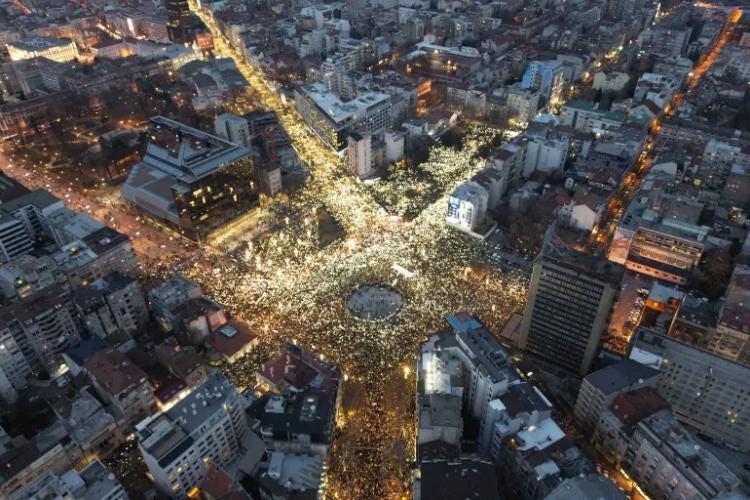
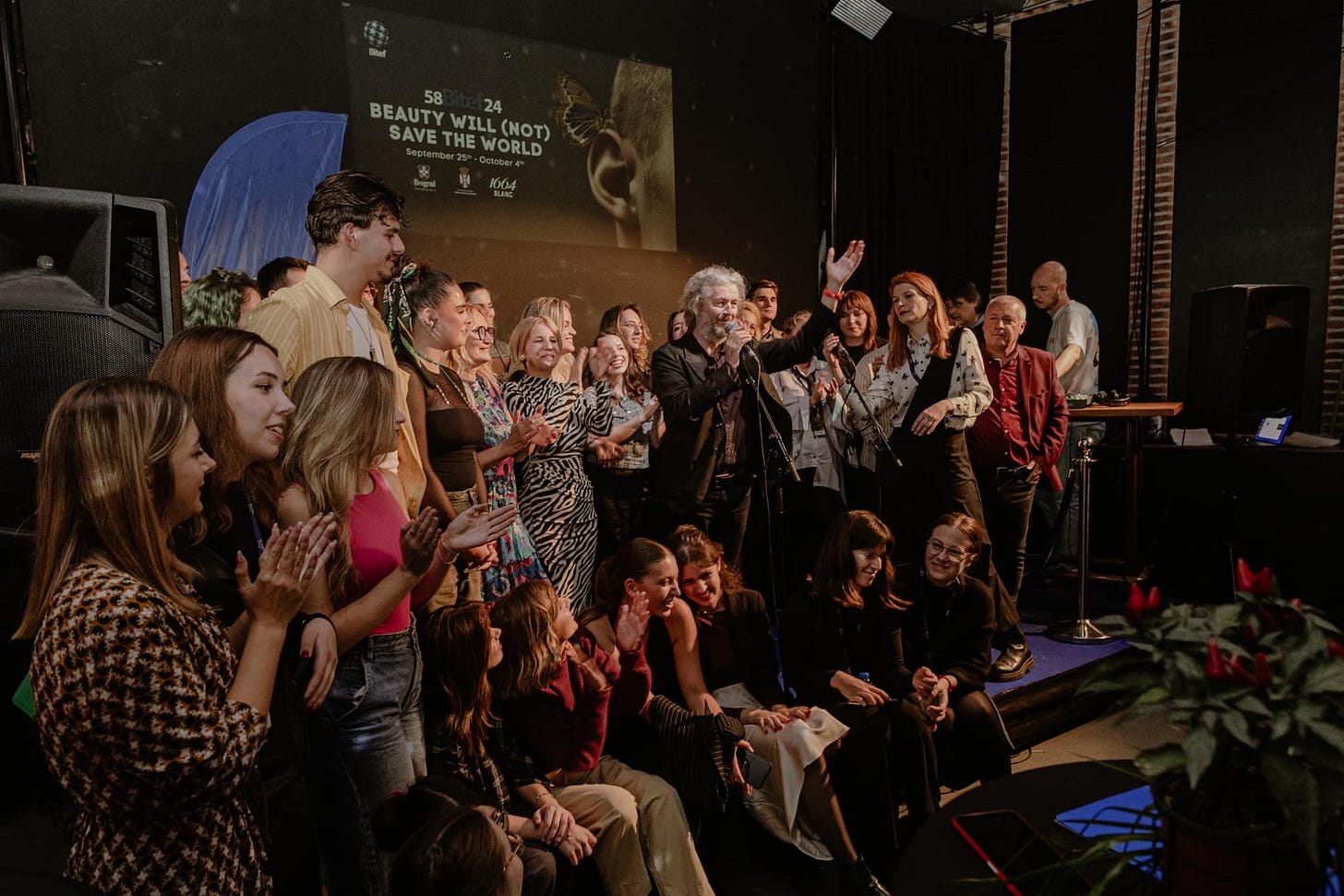
I can’t read this without thinking about our situation here where DOGE is cutting everything that doesn’t serve its master. I hope Nikita and all the others find their footing as we find ours. Great article and always surprising.